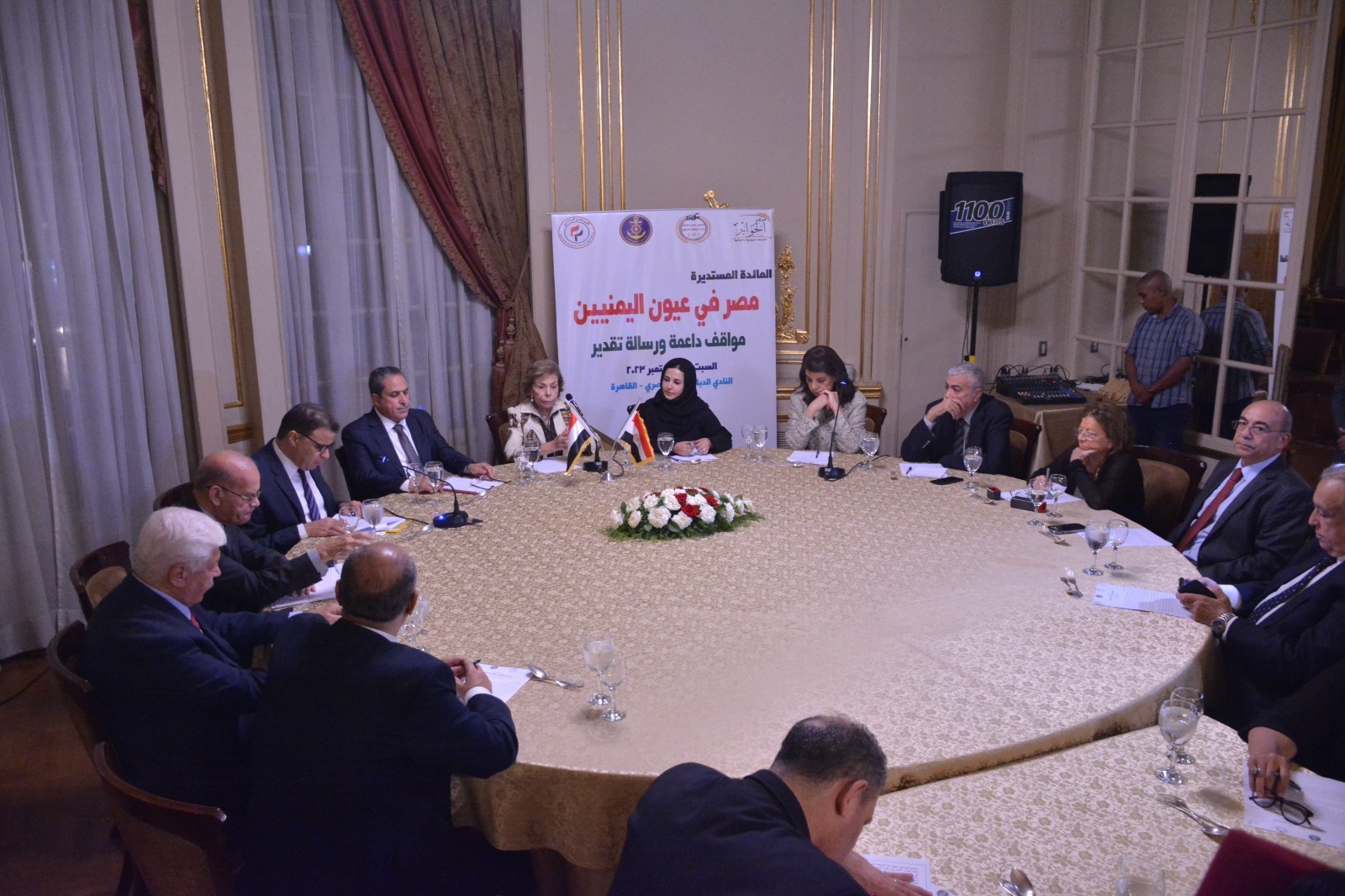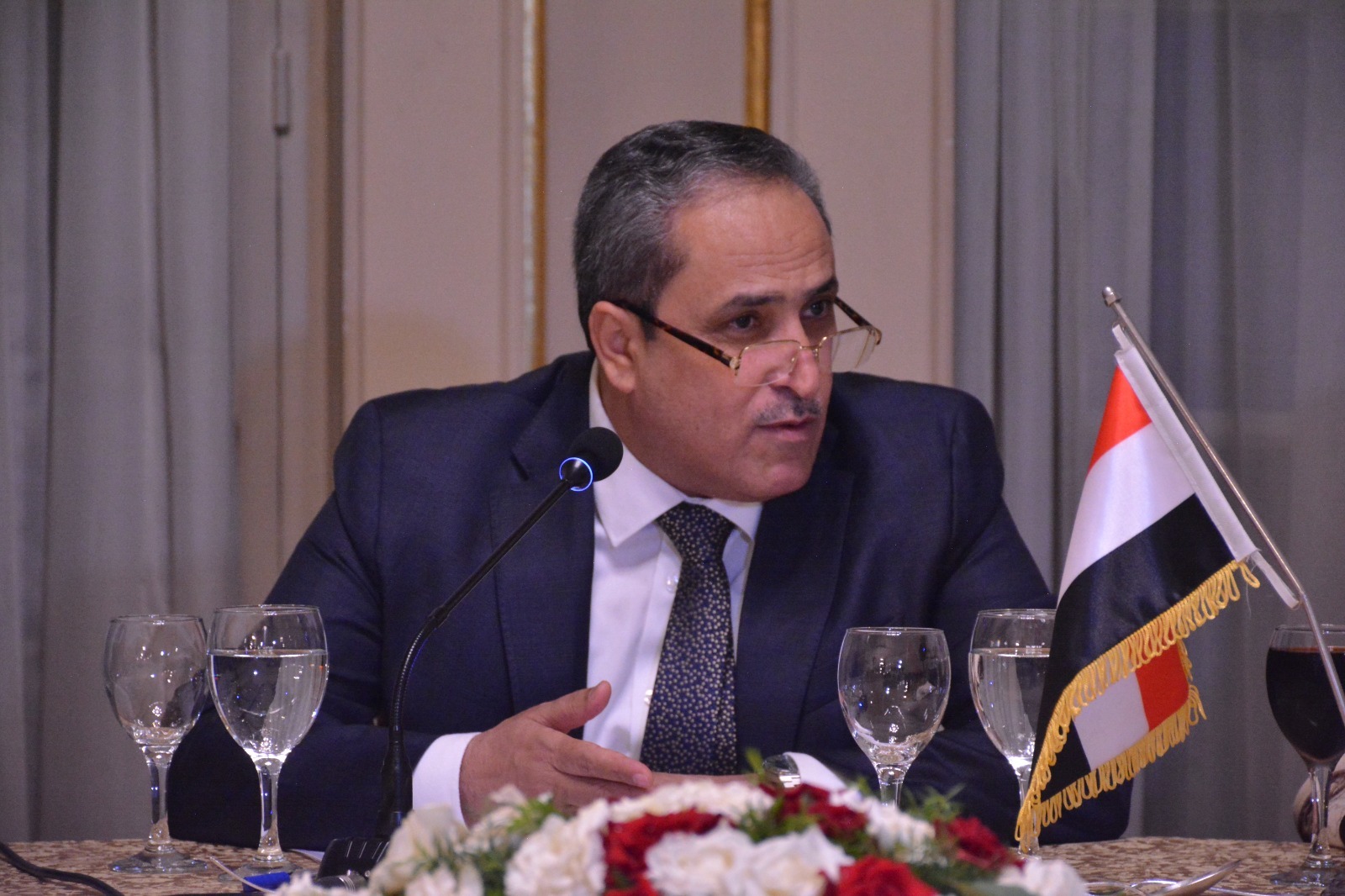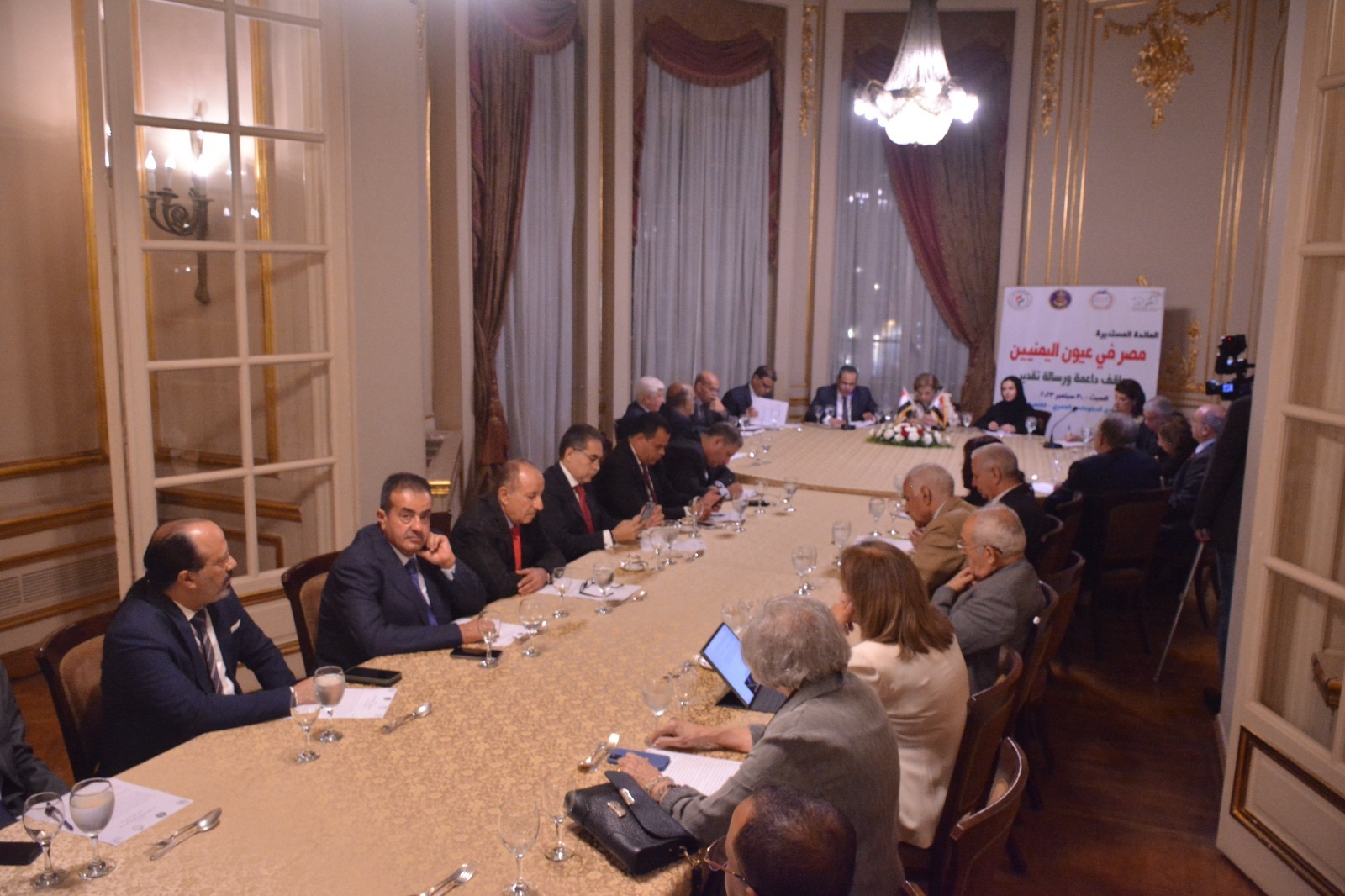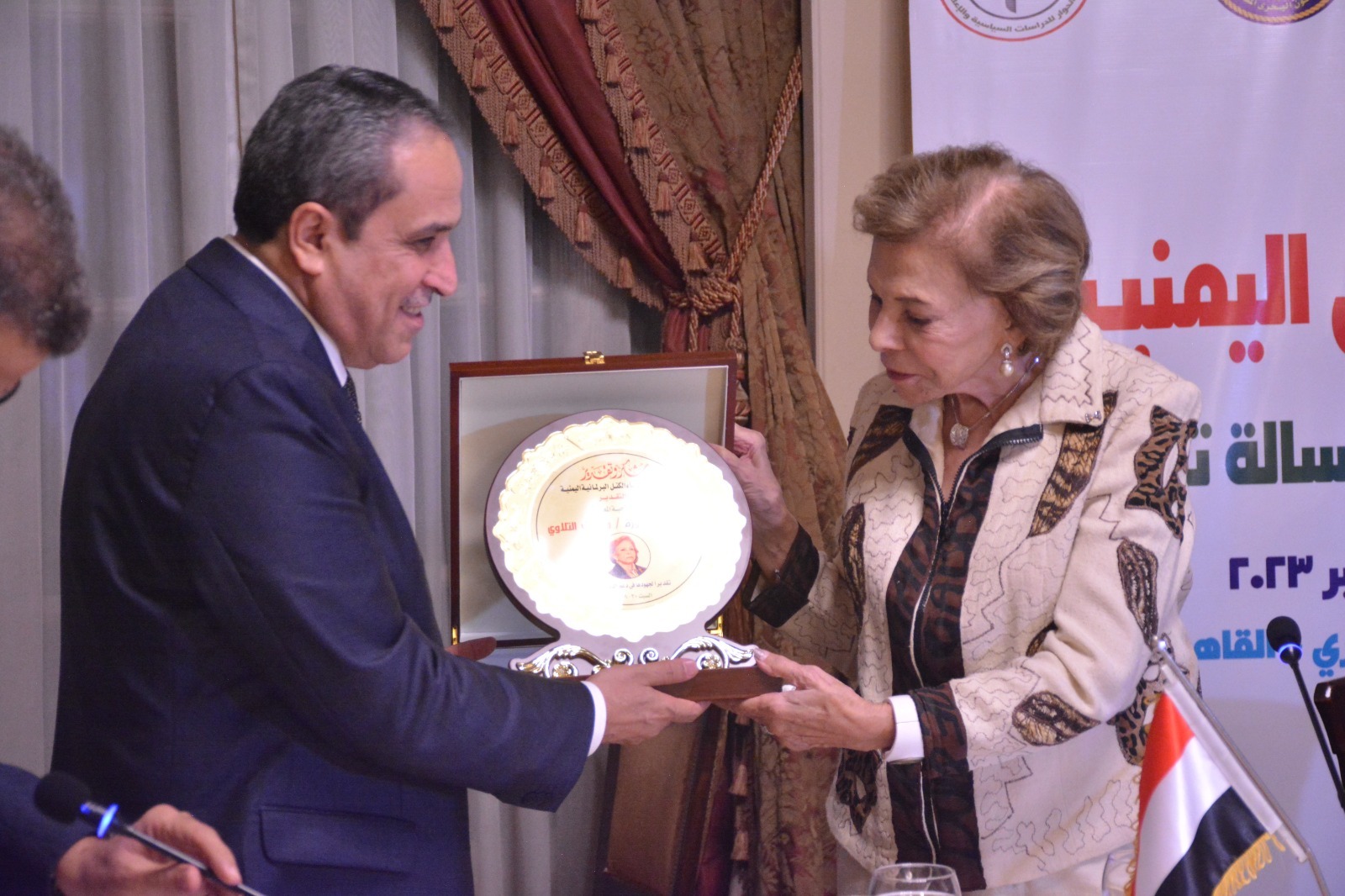Googl plus

MP Abdul Razzaq al-Hijri, head of the Parliamentary Bloc of the Yemeni Islah Party, said that for Yemen, Egypt represents a supporter in times of adversity and during crucial shifts from one certain political condition to another.
In the speech of the Parliamentary Blocs under the slogan “Egypt from the perspective of the Yemenis” during the round table meeting held at the headquarters of the Al-Hewar Center for Political Studies in the Egyptian capital, Cairo, al-Hijri referred to the pivotal role played by Egypt, under the leadership of His Excellency President Abdel Fattah El-Sisi, with regard to the developments that Yemen has been experiencing since the rebellion of the Iranian-backed Houthi group on constitutional legitimacy and national consensus in September 2014, in light of the humanitarian catastrophe resulting from this group waging a devastating war against Yemen and its people, and it is still continuing until now.
He stressed the major role that Egypt plays in supporting the legitimate government, the unity and political stability of Yemen, and also the role it plays in dealing with the security repercussions resulting from the rebellion in Bab al-Mandab and the southern Red Sea, noting that Egyptian diplomacy to support legitimacy has been active in international forums.
The head of the Islah Party Bloc in Parliament reviewed the various historical stages in which Egypt was a supporter of Yemen and the revolution of September 26, 1962, with its full military, political, and national weight. This revolution was the greatest turning point in the history of Yemen. It was the revolution that rid Yemen of the backward priestly Imami rule and established a republican regime on its ruins, which was inspired by the Egyptian experience and was guided by its political steps and development path, indicating that Egyptian and Yemeni blood has mixed in order to support the revolution.

During his speech, he touched on Egypt’s pivotal contribution in forming state institutions at the beginning of the republic in confronting the legacy of backwardness that was bequeathed by the rule of the Imamate, and in bringing about development in the fields of education, health, culture, thought and other fields of development, as well as in supporting the armed struggle of the October 14 Revolution 1963, and the liberation of South Yemen from British colonialism and its consequences. Egypt was also the closest model that the Yemenis drew inspiration from in various fields.
Al-Hijri drew attention to the escalation of the Egyptian political presence in Yemen during the last two decades and with the escalation of the Yemeni crisis, with the aim of contributing to its solution, in addition to its presence within the meetings of the Friends of Yemen Group and within the countries supervising the implementation of the Gulf Initiative.
He made it clear the role played by Egypt since the Houthi militia's coup against the legitimate authority and the national consensus in September 2014, stressing that this role came as an extension of Egypt's firm nationalist and Arab position that supports Yemen's stability, unity, and territorial integrity. He also pointed out its haste to declare its support for the Arab Alliance supporting legitimacy led by the Kingdom of Saudi Arabia, and to contribute effectively at the regional and international levels to form a unified position towards the Yemeni crisis.
On the political side, al-Hijri noted Egypt’s continued commitment to supporting Yemeni legitimacy and the stability of the country since the first moment of the launch of “Al-Hazm Storm” on March 25, 2015. Al-Hijri considered that this commitment is an authentic commitment that stems from strong relations and common interests, considering that the stability of Yemen is an integral part of Egyptian and Arab national security.

In his paper presented at the round table, al-Hijri also spoke about the humanitarian role that Egypt played towards Yemen. Egypt was quick to provide facilities to absorb the largest possible number of displaced people from Yemen, and it dealt with them from a sincere fraternal, national and Arab perspective. Al-Hijri considered this as a position that is added to Egypt's positions towards the Yemenis in contemporary history and strengthens Egypt’s position in the leadership of the region.
Regarding Egypt’s perspective on the Yemeni crisis, al-Hijri stressed that it proceeds from the perspective that security between the two countries is an indivisible whole and that Yemeni security is an extension of Egypt’s security, as well as from Egypt’s historical role towards Yemen and from the security, geographical and political integration between the two countries.
Al-Hijri said that Egypt's perspective towards the Yemeni crisis proceeds from the Egyptian diplomatic role and the Egyptian government's vision to play an active role in promoting international peace and security and protecting the waterways in the region, in addition to paying attention to the security needs for the Arab countries overlooking the Red Sea and the Arabian Gulf. This position is considered one of the main foundations of Egypt's foreign policy.
He continued, saying: "We are well aware that our brothers in the Arab Republic of Egypt believe in the necessity of restoring the Yemeni state institutions in order to be able to secure the Bab al-Mandab Strait and international shipping lanes and remove the danger of the militias threatening international shipping routes because Yemen oversees the most important oil transport corridor in the world, which is Bab Al-Mandab, which is considered a security for the Suez Canal, and that the Houthis’ seizure of the Yemeni coast overlooking the Red Sea and Bab al-Mandab will have the greatest impact on the international shipping corridor and Egyptian national security. This is seen as a strategic threat to it, which necessitates Egypt’s continued role in securing and protecting strategic waterways.
Regarding approaches to resolving the Yemeni crisis, al-Hijri praised all international and regional efforts, foremost of which are the efforts of the brothers in the Kingdom of Saudi Arabia and the Sultanate of Oman. He noted the assurances of the legitimate government, parliament, political parties, and forces that any peace process must be based on a comprehensive and lasting peace in accordance with national, regional, and international references, and that these consultations do not contain any gaps that could plunge Yemen into a new cycle of war and preserve the legal status of the state in terms of the cohesion of its entity and the imposition of its authority and performance over all its functions, and that it does not contribute to the legitimization of militias.
He stressed that one of the foundations of any peace process is the state’s monopoly on weapons and that it be the only one that has the right to legally use coercive force, which requires withdrawing weapons from the militias, and that any political settlement has to preserve the sovereignty, independence, and unity of Yemen, in addition to restoring appreciation and respect for the September 26 Revolution, which represented the most important transformation and gain in the contemporary history of Yemen.
Al-Hijri stressed that the settlement should lead to an end to the Houthi militia’s coup against the state and its consequences, represented in the systemized destruction of the state’s administrative apparatus, the destruction of the social fabric, the plundering of public and private property, and the mock rulings issued against the state’s leaders and every person who rejected the control of the Houthi militia, as well as ensuring Arab national security so that the state’s authority and its vital institutions are in a state of integration and harmony with the Arab environment surrounding Yemen, in addition to achieving transitional justice in a way that ensures determining criminal responsibility for war crimes committed by the Houthi militias, their violations of human rights, and reparations for victims in order to achieve justice and end impunity.

It should be noted here that members of the Yemeni Parliament, an elite group of diplomats, representatives, specialized experts, military personnel, and media professionals from the Yemeni and Egyptian sides participated in the round table meeting. This meeting was chaired by Minister Dr. Mervat al-Tallawi, former Under-Secretary-General of the United Nations, who opened the meeting by emphasizing the depth, strength, and diversity of Egyptian-Yemeni relations, and that the title of this round table came as an initiative by representatives of the Yemeni people to express their gratitude to the Egyptian state and its political leadership.
During the meeting, the Yemeni Ambassador, Bushra al-Eryani, praised the active role, movements, strenuous efforts, and honorable positions undertaken by the Egyptian Ministry of Foreign Affairs, headed by Minister Sameh Shoukry, explaining that Egyptian policy is based on pioneering diplomatic visions that seek to confirm the Egyptian role and its leadership in the Arab, regional and international levels, which is the role in which the Yemeni issue received wide-ranging attention.
At the conclusion of this meeting, the final statement issued by the round table meeting under the slogan “Egypt from the perspective of the Yemenis” referred to Egypt’s pivotal role under the leadership of President Abdel Fattah Al-Sisi and its always supportive positions for the Yemeni people and its political leadership headed by Dr. Rashad Al-Alimi, in an effort to achieve stability and peace in Yemen.
The final statement made it clear that the words of the Yemeni Parliament members came praising the Egyptian role in supporting the stability of Yemen, noting that there are approximately 3 million Yemeni citizens in Egypt who live a decent life. They thanked and appreciated the Egyptian state, led by President Abdel Fattah El-Sisi, for the good hospitality of the Yemenis and also for the wise Egyptian policy in dealing with the Yemeni issue.
The statement noted the representatives’ speeches that Egyptian-Yemeni relations were and still represent a model of established brotherly relations, which is confirmed by the Egyptian positions in support of Yemen, whether through the honorable positions of the Egyptian Foreign Ministry or through presidential diplomacy and its confirmation that Egypt has a special place in the hearts of the Yemenis.
At the conclusion of the meeting, members of the Yemeni parliamentary blocs honored Minister Dr. Mervat Al-Talawi, former Under-Secretary-General of the United Nations, in appreciation of her historical role in supporting Arab and humanitarian issues in general and the Yemeni issue in particular.